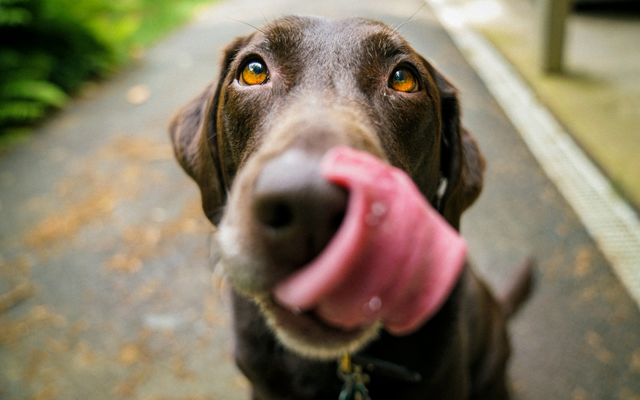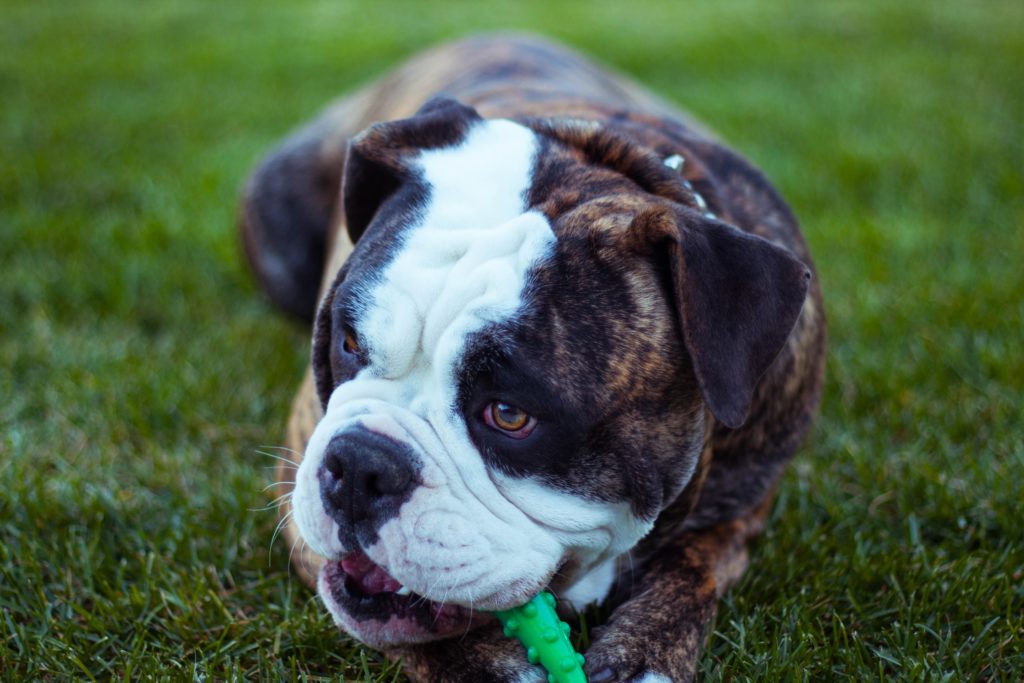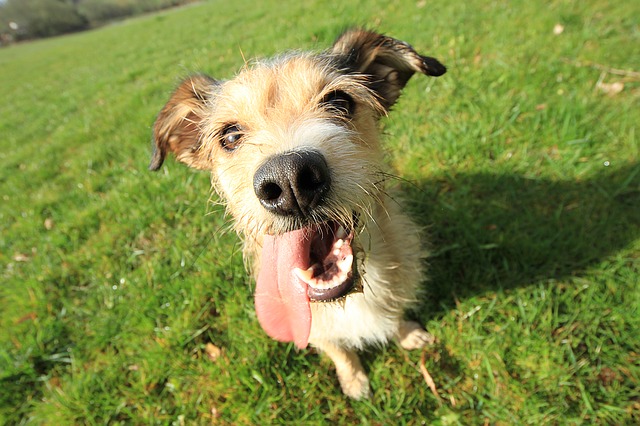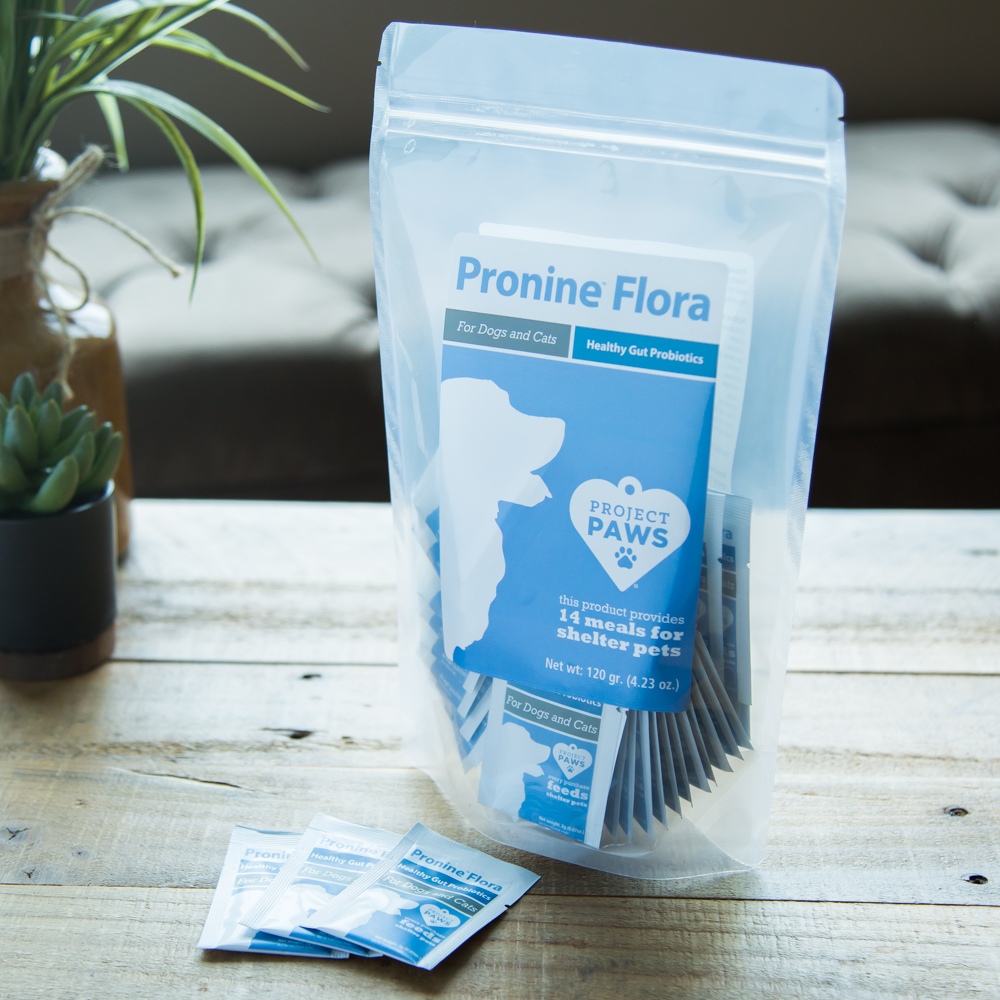Catching your dog chowing down on their own waste is enough to make your stomach churn, especially when you think about the big slobbery kiss they’re bound to give you later. The technical term for consuming feces is coprophagia, and it’s a condition that almost always has to do with a problem in your dog’s digestive system.
Related: Best Probiotics for Dogs
It could be a general lack of nutrition that has your dog searching the yard for an unsanitary snack, and for many poop-eating pups, an unbalanced intestinal microflora is to blame. A dog’s intestinal microflora is made up of good and bad bacteria that assist in breaking down food and absorbing nutrients. The helpful bacteria are called probiotics, and a dog that doesn’t get enough probiotics in their diet could resort to eating their own waste.

What’s the Deal With Probiotics?
Many people recognize probiotics as a daily pill they take to improve digestion or as a word printed on yogurt containers. Probiotics have long-since been proven to benefit humans, and advancements in veterinary science show they also do good work for man’s best friend. Most people think bacteria is bad, but probiotics are good bacteria that are essential for gut health in both dogs and people. They’re often the key to treating digestive issues including chronic diarrhea, constipation, gas, and acid reflux. According to WebMD, they stimulate nerves that control gut movement to keep food moving smoothly through the digestive system. Humans and canines obviously have different biology, but veterinarians and animal nutritionists have found good bacteria is just as important for dogs as it is for people.
Probiotics in Dogs
Dogs naturally produce some of the digestive enzymes and intestinal microflora they need for healthy digestion, but they rely on the food they eat to fill in the gaps. Most dogs today eat diets of high-carb dry dog food because it’s convenient and affordable for humans. It’s not that dry dog food is bad for dogs, but eating that cooked kibble isn’t natural. Their bodies are designed to be carnivores preying on whatever animals they can hunt down. The difference between a natural diet made up of prey and an inorganic meal of commercial dog food is a lack of nutrition.

Dr. Karen Becker with Mercola Healthy Pets explains how and why dogs are missing out on essential probiotics. Because probiotics are live bacteria, it’s virtually impossible for them to survive long enough to do their job in a commercial pet food. Many dog food recipes include probiotics to begin with, but heat from cooking and preservatives needed for a long shelf life kill them off.
In the wild, dogs get live probiotics and digestive enzymes by eating raw meat. When a wolf takes down a deer, they eat the deer’s digestive tract. Inside those digestive organs are things like digestive enzymes and live probiotics that the wolf needs to digest their own food. Dogs typically don’t go prowling the forest ready to take down prey, and even dogs that are fed raw diets don’t get entrails in their dish. All this leads to an unbalanced microflora where the bad bacteria is stronger than the good.
How a Probiotic Supplement Can Stop Your Dog From Eating Poop
When a dog eats their own poop, something is missing from their diet. For whatever reason, they’re trying to make up for gaps in their nutritional intake and unbalanced microbiome. Adding probiotics to their diet can get their system back on track. A healthy gut is essential for a healthy dog, and supplements are the most effective way to make sure they get what they need.

Giving your dog a daily supplement including probiotics and all the other digestive essentials that make up a healthy gut will help them stave off digestive upset. It’ll give their body what it needs to correct digestive issues while filling in nutritional gaps left by an inorganic and incomplete diet. When they get everything they need at mealtimes, they’ll be less likely to go foraging for feces later.
Choose the Right Supplement
The best kind of digestive support is a supplement that includes all the good stuff that goes into a healthy gut. Your dog needs probiotics, prebiotics, digestive enzymes, and even digestive herbs to keep things humming. Pronine™ Flora from iHeartdogs is a four-in-one digestive aid that covers all your dog’s digestive needs. It helps restore digestive balance while relieving symptoms of poor nutrient absorption and food digestion including constipation, gas, and diarrhea.
Eating poop is a dirty little habit you wish your dog would drop already, but it’s not something that will simply go away. Help your dog overcome their digestive issues by prioritizing their gut health. When their gut gets everything it needs, your dog will be less likely to consume their own feces. Talk to your vet about the benefits of a probiotic supplement before you’re the victim of a poop-breath dog kiss.
Related: 12 Best Dog Breath Fresheners
Featured Photo by James Barker on Unsplash
These statements have not been evaluated by the Food and Drug Administration. This product is not intended to diagnose, treat, cure, or prevent any disease. The information on this website is not intended to replace a one-on-one relationship with a qualified healthcare professional.
- Best Joint Supplement for Dogs
- Best CBD Gummies for Dogs
- Goat's Milk for Dogs
- Skin & Coat Supplements for Dogs
- Weight Gain Supplements for Dogs
- Muscle Building Supplements for Dogs
- Heart Supplements for Dogs
- Multivitamins for Dogs
- Pill Pockets for Dogs
- Digestive Enzymes for Dogs
- Turmeric for Dogs
- Liver Supplements for Dogs
- Tear Stain Supplement for Dogs
- Breath Fresheners for Dogs
- Kidney, Urinary, & Bladder Supplements for Dogs
- Stool Eating Deterrent for Dogs
- Eye Supplements for Dogs
- Melatonin for Dogs
- Apple Cider Vinegar for Dogs
- Green Lipped Mussels for Dogs
- L Theanine for Dogs
- Chondroitin Supplements for Dogs
- MSM for Dogs
- Valerian Root for Dogs
- Chamomile for Dogs
- Boswellia for Dogs
- L Tryptophan for Dogs
- Yucca for Dogs
- Licorice Root for Dogs
- Bromelain for Dogs
- Papain for Dogs
- Devil's Claw for Dogs
- Quercetin for Dogs
- Hemp gummy for dogs
- Best Hemp Dog Treats
- Best Hemp Oil for Dogs
- Best Calming Treats, Chews, & Supplements for Dogs
- Best Bone Broth for Dogs
- Best Fish Oil for Dogs
- Best Probiotics for Dogs
- Best Hip Dysplasia Supplements for Dogs
- Best Colostrum for Dogs
- Best Quercetin for Dogs
- Best Greens for Dogs Supplements
- Best Vitamin C Supplements for Dogs
- Best Probiotic for Dog with Allergies
- Best Taurine Supplements for Dogs
- Best Dog Food Toppers
- Best Anal Gland Supplement for Dogs
- Best Dog Probiotic Powder
- Best CoQ10 Supplement for Dogs
- Best Liquid Glucosamine for Dogs
- Best Wrinkle Creams, Balms, and Wipes for Dogs
- Best Puppy Calming Treats
- Best Colloidal Silver for Dogs
- Best Adaptogen Supplements for Dogs
- Best Cognitive Supplements for Dogs
- Best Bee Pollen for Dogs
- Best Vitamin A Supplements for Dogs
- Best Vitamin E Supplements for
- Best Liquid Glucosamine Supplements for Dogs
- Best SAM-e Supplements for Dogs
- Best Hyaluronic Acid Supplements for Dogs
- Best Apple Cider Vinegar Supplements for Dogs
- Best Diarrhea Medicine for Dogs
- Best Milk Thistle for Dogs
- Best Turkey Tail Mushroom Supplements for Dogs
- Best Astaxanthin Supplements for Dogs
- Best Lutein Supplements for Dogs
- Best Electrolyte Supplements for Dogs
- Best Coconut Oil for Dogs
- Best Prenatal Vitamins for Dogs
- Best Puppy Milk Replacements
- Best Iron Supplements for Dogs
- Best Dewormer Products for Dogs
- Best Mange Medications for Dogs
- Best Cough Relief Products for Dogs
- Best Sinus Relief Products for Dogs
- Best Collapsed Trachea Supplements for Dogs
- Best Fireworks Anxiety Relief Products for Dogs
- Best Thunderstorm Anxiety Relief Products for Dogs
- Best Travel Anxiety Relief Product for Dogs
- Best Supplements for a Dog with a Torn ACL
- Best Supplements for a Dog with Patellar Luxation
- Best Supplements for a Dog with Intervertebral Disc Disease
- Best Zinc Supplements for Dogs
- Best Biotin Supplements for Dogs
- Best Tart Cherry Supplements for Dogs
- Best Resveratrol Supplements for Dogs
- Best Ginkgo Biloba Supplements for Dogs
- Best Ashwagandha Supplements for Dogs
- Best Supplements for Dogs with Cushing's Disease
- Best Adrenal Supplements for Dogs
- Best NAD+ Supplements for Dogs
- Best NMN Supplements for Dogs
- Best Supplements for Dogs with Dementia
- Best Supplements for Dogs with CCD(Canine Cognitive Dysfunction)
- Best Fiber Supplements for Dogs
- Best Spirulina for Dogs
- Best Hairball Remedies for Dogs
- Best Eye Drops for Dogs with Allergies
- Best Magnesium Supplements for Dogs
- Best Brushes for Double-Coated Dogs
- Best Dandelion Root Supplements for Dogs
- Best Probiotic for Dogs with Yeast Infections
- Best Flaxseed Oil for Dogs
- Best Chamomile Supplements for Dogs
- Best Lavender Supplements. Treats & Sprays for Dogs
- Best Collagen Supplements for Dogs
- Best Kelp Supplements for Dogs
- Best Activated Charcoal for Dogs
- Best Slippery Elm Supplements for Dogs
- Best Supplements for Dogs with Seizures & Epilepsy
- Best Antioxidant Supplements for Dogs
- Best Ubiquinol Supplements for Dogs
- Best Hormone & Glandular Supplements for Dogs
- Best Thyroid Supplements for Dogs
- Best Iodine Supplements for Dogs
- Best Dog Shedding Supplements for Dogs
- Best Detox Supplements for Dogs
- Best Postbiotics for Dogs
- Best Aspirin Products for Dogs
- Best Dog Anti-Nausea Products
- Best Dog Mouthwashes
- Best Camelina Oils for Dogs
- Best Hemp Seed Oils for Dogs
- Best Natural Anti-Inflammatories for Dogs
- Best Cancer Supplements for Dogs
- Best Sardine & Anchovy Oils for Dogs
- Best Fatty Acid Supplements for Dogs
- Best Chia Seed Supplements & Treats for Dogs
- Best Olive Oils for Dogs
- Best Amino Acid Supplements for Dogs
- Best Moringa Supplements for Dogs
- Best Echinacea Supplements for Dogs
- Best Cranberry Supplements for Dogs
- Best D-Mannose Supplements for Dogs
- Best Nettle Leaf Supplements for Dogs
- Best Marshmallow Root Supplements for Dogs
- Best Astragalus Supplements for Dogs
- Best Pumpkin Seed Supplement for Dogs
- Best Supplements for a Dog Wetting The Bed
- Best Blueberry Supplement for Dogs
- Best Bromelain Supplements for Dogs
- Best Yucca Supplements for Dogs
- Best Ginger Supplements for Dogs
- Best Rosehip Supplements for Dogs
- Best Allergy Medicines for Dogs
- Best Reishi Mushroom Supplement for Dogs
- Best Maitake Mushroom Supplement for Dogs
- Best Chaga Mushroom Supplement for Dogs
- Best Shiitake Mushroom Supplement for Dogs
- Best Cordyceps Mushroom Supplement for Dogs
- Best Lion's Maine Supplement for Dogs
- Have question? - Ask in our Dog Health Forum

 Toledo, United States.
Toledo, United States.